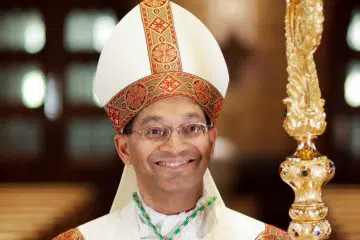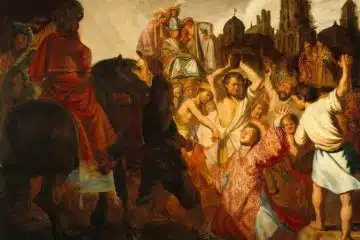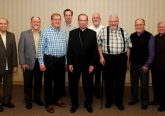Guest Column: Shaking the church at its foundation
Thursday, April 29, 2010
By Father Satish Joseph
Here are three scenarios I present to you. First scenario: Sex-starved celibate clergy on the prowl, greedily eying children — or anyone — whom they can sexually exploit. Second scenario: Emotionally unaffected celibate men, holy priests in every sense of the word, who by some supernatural power are able to live exemplary lives all the time — every one of them. Third scenario: Catholic priests, human in every sense of the word, who strive to answer to the call of God and the church community to the best of their ability, weak and vulnerable as any other person, yet most of them exhibiting extraordinary sacrifice, commitment and love.
I hope it is obvious to you that scenario one and two are both exaggerations. The third scenario is closer to the reality.
The third scenario seems to me to be also closer to the story of Peter in April 16’s first and Gospel readings. We are familiar with Peter’s story. From his self-proclaimed commitment to his triple betrayal of Christ, Peter changed his mind all too often. Christ took him from fishing and told him that he would be fishing for people. But the man who had vowed to die alongside Christ seemed to have strayed from his commitment. In the Gospel reading, we find Peter impetuously leading the disciples in the opposite direction that Christ would have him go. “I am going fishing,” he said to them. The rest of the disciples followed suit.
It was at this moment that Jesus appeared to Peter and reminded him of his original calling. Yes, Peter must stay and struggle with the people out of his love for Christ.
Finally, Peter is a changed man. Peter the denier stands in front of the very authorities who crucified Jesus and says, “We must obey God rather than men.” His courage and commitment would lead him all the way to martyrdom.
The history of the church is as murky as Peter’s life. We know too well the church that was persecuted for the first 300 years of its existence and then got its fortunes mixed up with the state when Constantine made Christianity the state religion. Later, the kind of Christianity that the colonizers introduced in many parts of the world was hardly the Christianity of Christ; it was a Christianity that was more obedient to men than God. Colonial Christianity had nothing to do with the Beatitudes — the kingdom of the poor, the meek, humble, and reconciling Christ. The Crusades, the Dark Ages, the circumstances leading to the Reformation and the Inquisition were all events that taught the church many lessons.
But in the midst of all the human weaknesses were holy men and women who remained shining examples of holiness and undying love for the Christ and His church. Augustine, Thomas Aquinas, Bonaventure, Francis of Assisi, Francis Xavier, Teresa of Avila, Joan of Arc, Pope Gregory the Great, John the XXIII, Oscar Romero, Mother Teresa, Dorothy Stang – these and many others strove for holiness in the same church that was at once holy and sinful.
We cannot ignore movements of renewal in the church — monasticism, the growth of religious life and the counter-reformation. Who can forget missionaries and their heroism? But it was the Second Vatican Council which initiated a new Pentecost in the church. It reminded the church of its true mission — to be the true presence of Christ in the world.
Today, thousands of priest, nuns and laypeople around the world continue to live out their commitment to Christ in extraordinary ways.
Nothing reminds us more about the divine and human reality of the church than the crisis emerging from child abuse and the manner in which erring priests were disciplined or not by the church leadership. This new crisis is threatening the unity and peace of the church. This crisis has shaken us at its very foundation. The responses range from abandonment of faith to the denial that we have a problem. At the least, we need to be able to respond to this crisis in some sensible way.
As a result of the child abuse crisis, a number of steps have been initiated in the United States so that not just children, but all vulnerable people, feel safe. We must admit that our understanding of pedophilia, its remedies, the role of authority and other professionals in this regard was not always clear. I am relieved that things are better organized, but I am also sure that we will continue to learn more.
I want to draw attention to the responses made by those in church authority. Some of these make me proud; others make me cringe. The responses equating the present crisis for the church with anti-Semitism, or drawing a parallel between homosexuality and pedophilia, or blaming sexual sins of priests on the easy access of internet porn, or for that matter, linking celibacy with pedophilia are all, in my opinion, unfounded.
The pope seems to be headed in the right direction as he calls the church to penance. Along with many other church leaders and laypeople I, too, believe that is this is not the time to be defensive or throw the blame on others, but to be honest with ourselves, to be compassionate and just to the victims of abuse, to examine the organizational structure of the church, to examine the use and abuse of power and authority and to be repentant of our personal and organizational failures.
Most of all, both the church leadership and each one of us must ask this question: “What is God saying to us?” I truly believe that God is saying something to the church in this time of crisis, and we must not miss God’s presence to us.
Another kind of response is emerging today — people who want to see the church lose her place in the world at any cost. There are atheists, anti-Catholics, anti-clerical groups and many other people who have only one goal in all of this — to see the church destroyed. No matter how sincere the church might be, for them she can never be honest enough. Their goal is not reconciliation or healing; their goal is a church deprived of its wealth, power, history and tradition.
May I suggest that we alienate ourselves from responses that stem from resentment, revenge, anger, and distrust? Rather, let the goal of our own response be healing and reconciliation.
Our presence at the Eucharist seems to suggest that we are a people of faith. We believe in God and we still believe that we are a very human church that is led by Christ himself. We are all too human, yet, with God present to us in the Eucharist, God will continue to call us to repentance, to love, to healing, to mission and to being the presence of Christ in this world. Let us be ready with our response to Christ.
Father Joseph is parochial vicar at St. Helen Church in Dayton. This commentary is adapted from a recent homily.













